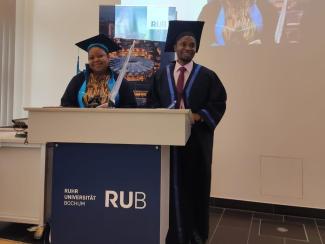Studying abroad
International degrees, national development

Uganda has made efforts to improve both the scope and quality of education. The country has expanded universal primary and secondary education. It has also invested heavily in the quality of education by improving infrastructure, raising teachers’ salaries and improving research and curriculum development.
Despite these efforts, however, there are still numerous challenges. Many public schools and universities are poorly run and cannot provide the quality of education that learners need. Progress has also been slow in changing the curricula, which are still based on colonial education, to modern curricula that meet the needs and challenges of modern Uganda. As a result, the education system is failing to train the qualified workforce that the country needs for its development.
In this environment, many parents and learners are looking outside Uganda for better educational opportunities. Universities in countries such as the US, the UK and Germany are renowned in Uganda for their academic excellence, cutting-edge research and state-of-the-art facilities. Students studying at these institutions can benefit from quality education and innovative teaching methods that are not available locally.
In addition, studying abroad exposes students to a variety of academic perspectives. Institutions conduct advanced research through often very diverse students and lecturers. Exposure to different educational systems can foster critical thinking, adaptability and a broader understanding of global issues.
When I came to Ruhr-Universität Bochum in 2020 to do a Master’s in Development Management, I was able to experience how much the teaching institutions in Germany and those in Uganda diverge.
Personal growth and development
Living and studying in a foreign country requires a high degree of independence and self-reliance. As a student in Germany, I had to adapt and learn how to manage my finances, find my way around new cities and complete my day-to-day tasks independently. These experiences have significantly improved my problem-solving skills and resilience, which is invaluable in both my personal and professional life.
Studying abroad further offers a unique opportunity for cultural exchange. I was part of a diverse group of over 20 students from all continents. At the time I was in Germany the Covid-19 pandemic made social distancing and online learning mandatory. Despite the difficulties, we found ways to connect, support each other and build lasting bonds.
A foreign education enables one to acquire the ability to interact with people from different backgrounds, fostering a deeper understanding and appreciation of other cultures. This engagement not only broadens one’s worldview, but also enhances the ability to work in a multicultural environment – which is becoming increasingly important in today’s globalised job market.
Professional advantages
An international degree can open doors to a wide range of career opportunities that would not be possible with a local degree. Employers often view an international education as evidence of an applicant’s adaptability, determination and ability to navigate different environments. In addition, many universities abroad have strong links with leading companies and offer extensive career services, internships and networking opportunities that can greatly enhance employability. After my studies in Bochum, I returned to work in Uganda. However, many of my colleagues stayed in Germany where they found employment.
I have more clout with a German university degree. Employers value my educational background because of the quality attributed to a university education in a European country.
In addition, studying abroad allows you to build a global network of friends, mentors and professional contacts. These connections can be invaluable for future career prospects, whether in Uganda or internationally. The friendships and professional relationships forged during studies often develop into lifelong networks. I still keep in touch with alumni from my degree programme today.
Upon returning to their home country, students who have studied abroad can bring back valuable knowledge, skills and innovative ideas. This knowledge transfer can contribute to national development by addressing local challenges. Graduates can introduce new technologies, practices and approaches that drive progress in various fields, from healthcare and education to business and technology.
Challenges
While a university degree abroad is valuable, it is not easy to obtain. The financial costs are the biggest obstacle. Tuition fees, living expenses and travel costs are a challenge for those seeking higher education abroad. Many families in Uganda live in poverty. They often take out large loans or rely on donations to allow their children to study abroad. Without these strategies, only the political elite and the rich in Uganda would be able to send their children to foreign universities.
Thanks to funding from the German Academic Exchange Service (DAAD), I was able to study at the Institute for Development Research and Development Policy (IEE) at Ruhr-Universität Bochum. Students should be aware of the numerous scholarships, grants and financial aid programmes available to help reduce the costs. However, the search for a scholarship also requires access to information, support and important networks.
Adapting to a new cultural and academic environment can furthermore be a challenge. Students may face language barriers, homesickness and cultural differences that affect their academic performance and general well-being. Universities abroad often offer support services, such as counselling centres and offices for international students, to help students navigate and adjust to their new environment.
Life in Bochum during the pandemic was particularly hard for me. However, these inconveniences were only a small price to pay compared to the benefits of obtaining the foreign degree.
Ronald Ssegujja Ssekandi is a Ugandan author and edits D+C/E+Z’s Nowadays column.
sekandiron@gmail.com
















